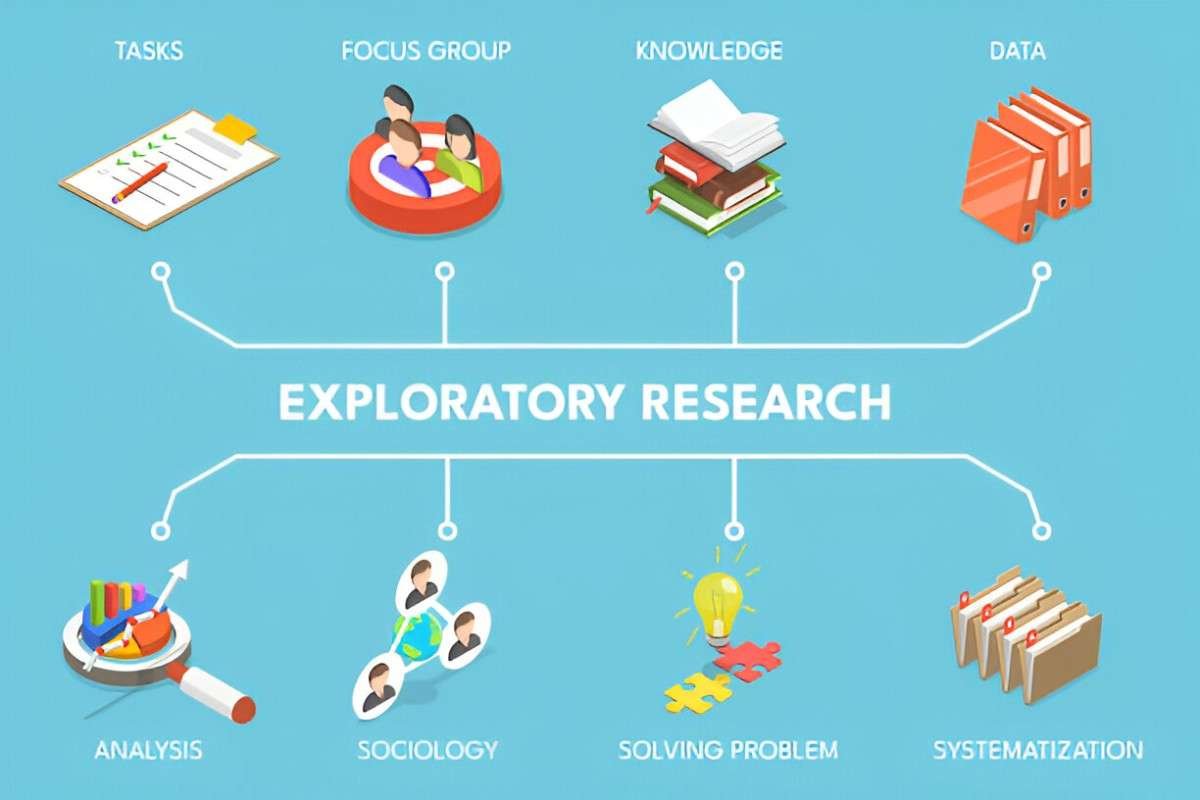Exploratory research is a vital tool used in various fields, including business, marketing, and social sciences, to understand phenomena, generate ideas, and gain insights. This type of research is especially useful when a problem is not well defined or when there is little existing information about a topic. This article will explain exploratory research in simple terms, covering its purpose, methods, and examples.
Table of Contents
What is Exploratory Research?
Definition and Purpose
Exploratory research is an initial study aimed at gaining a better understanding of a topic or problem. It is used when the problem is not clearly defined, and the researcher seeks to gather preliminary data that will help in formulating hypotheses or refining the problem for further research.
Key Points to Understand
- Initial Stage: It is typically the first step in the research process.
- Unstructured Approach: It involves a flexible and open-ended approach to gather insights.
- Generates Insights: Helps in understanding the problem more deeply and identifies new opportunities or areas for further investigation.
Methods of Exploratory Research
Common Techniques
- Literature Review
- Definition: Reviewing existing research and publications on the topic.
- Purpose: To gather background information and identify gaps in current knowledge.
- Example: Reading academic journals, industry reports, and articles related to consumer behavior in online shopping.
- Expert Interviews
- Definition: Conducting interviews with individuals who have expertise or experience in the area of interest.
- Purpose: To gain in-depth insights and practical perspectives.
- Example: Interviewing financial analysts to understand the impact of a new financial regulation.
- Focus Groups
- Definition: Organizing discussions with a small group of people who represent the target audience.
- Purpose: To collect diverse opinions and reactions.
- Example: Gathering a group of consumers to discuss their perceptions of a new product concept.
- Case Studies
- Definition: Analyzing specific instances or examples related to the topic.
- Purpose: To learn from real-life examples and understand the context better.
- Example: Studying a company’s successful marketing strategy to draw lessons for other businesses.
- Surveys and Questionnaires
- Definition: Distributing questionnaires to a sample of people to gather initial data.
- Purpose: To collect broad information and identify trends.
- Example: Conducting a survey to understand consumer preferences for different payment methods.
Benefits of Exploratory Research
Advantages for Researchers and Businesses
- Clarifies Research Problems
- Understanding the Issue: Helps in defining the research problem more clearly.
- Formulating Hypotheses: Provides a basis for developing hypotheses and further research questions.
- Generates New Ideas
- Innovation: Encourages creativity and the discovery of new perspectives and ideas.
- Identifying Opportunities: Helps in spotting new opportunities and areas for innovation.
- Flexibility in Research
- Adaptability: Allows researchers to adjust their approach as new information emerges.
- Comprehensive Understanding: Provides a broad understanding of the topic from multiple angles.
Practical Examples
Real-World Applications
- Market Research for a New Product
- Scenario: A company plans to launch a new line of organic snacks but is unsure about consumer preferences.
- Approach: Conducts focus groups, surveys, and interviews with nutrition experts.
- Outcome: Gains insights into consumer preferences, pricing expectations, and potential market segments.
- Understanding Employee Satisfaction
- Scenario: A firm wants to improve employee satisfaction and retention rates.
- Approach: Uses exploratory research methods such as employee interviews, focus groups, and surveys.
- Outcome: Identifies key factors affecting job satisfaction and areas for improvement in the workplace environment.
Importance of Exploratory Research
Impact on Decision Making
- Informed Decisions: Provides essential preliminary insights that help in making informed decisions.
- Strategic Planning: Helps businesses and researchers develop effective strategies based on initial findings.
- Problem Solving: Aids in identifying the root causes of problems and potential solutions.
Conclusion
Exploratory research is a fundamental step in the research process, providing essential insights and understanding of a topic. By using methods such as literature reviews, expert interviews, focus groups, case studies, and surveys, researchers can gather preliminary data that help define problems, generate ideas, and set the stage for further research. For learners of accounting and finance, understanding exploratory research is crucial, as it equips them with the skills to approach new and unfamiliar topics methodically and creatively, ultimately leading to better decision-making and problem-solving.





